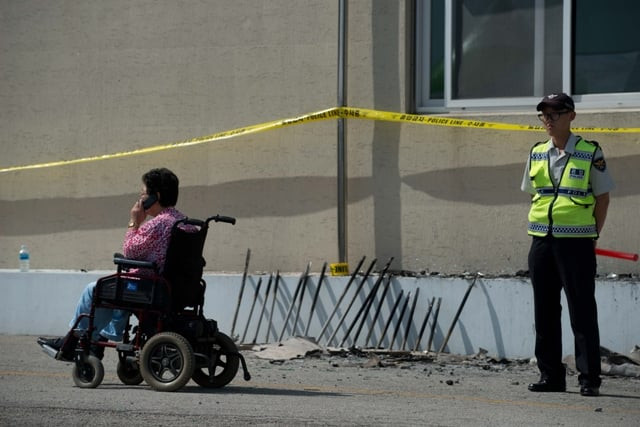South Korea hospice fire kills 21, patient arson suspected
Death toll likely to fuel existing debate over safety standards in S Korea, which is still reeling from ferry disaster

A woman in a wheelchair passes a policeman outside the fire-damaged Hyosarang hospital near Janseong on May 28, 2014. PHOTO: AFP
The high death toll is likely to fuel an already intense debate over safety standards in South Korea, which is still reeling from last month's ferry disaster that left some 300 dead -- most of them schoolchildren.
It was the second deadly fire in two days after seven people were killed in a blaze at a bus terminal near Seoul on Monday.
Most of Wednesday's victims died from asphyxiation, rescue officials said, as the fire on the upper floor of the three-storey facility filled the rooms and corridors with toxic clouds of choking smoke.
Another seven people were injured, six of whom were in critical condition from smoke inhalation.
The fire broke out shortly after midnight at the hospice in Jangseong county about 190 miles (300 kilometres) south of Seoul.
The facility cared for almost 80 chronically ill, often bedridden patients, including stroke victims and advanced Alzheimer's sufferers.
Local police chief Roh Kyoo-Ho said an 81-year-old male patient with dementia had been taken into custody after CCTV footage showed him entering a storage room where the fire was believed to have started.
"We are focusing on the possibility of arson," Roh said, while adding that the man, identified only as Kim, had denied any involvement.
"We found a cigarette lighter at the scene and forensic experts are examining it," he added.
Although the blaze was brought under control within 30 minutes, the physical condition of many patients on the upper floor meant they were unable to evacuate before being overcome by the smoke.
One of three nurses on duty died as she tried to douse the flames with a fire extinguisher.
South Korea is still in mourning over the April 16 sinking of the 6,825-tonne Sewol ferry, which caused many to question whether rapid economic development had come at the expense of basic safety standards.
There will be questions over whether the Jangseong hospice was properly staffed, given the relative immobility of the patients, and whether fire safety procedures were up to scratch.
Its chief administrator Lee Hyung-Seok knelt on the ground in front of press cameras outside the facility and touched his forehead to the ground in a display of contrition.
"I'm sorry. I apologise for this terrible thing," Lee said.
In the wake of the Sewol disaster, President Park Geun-Hye vowed harsh penalties for any acts of criminal negligence that resulted in fatal accidents.
Investigations have suggested the Sewol tragedy was almost wholly man-made: the result of cut corners, regulatory violations, poor safety training and a woeful lack of oversight -- all, or nearly all, attributable to a desire to maximise profits.
Park has ordered a radical overhaul of national safety procedures, including dismantling the coastguard whose response to the ferry disaster was widely criticised.
The patients killed in Wednesday's fire were among 34 people in wards on the upper floor, only seven of whom managed to escape the fire by themselves.
Both hospital staff and firefighters denied initial reports that some of the patients had been tied to their beds.
South Korea has a rapidly ageing population and the number of nursing homes and other facilities catering to the elderly has doubled to nearly 1,300 from just 690 in 2008.



















COMMENTS
Comments are moderated and generally will be posted if they are on-topic and not abusive.
For more information, please see our Comments FAQ